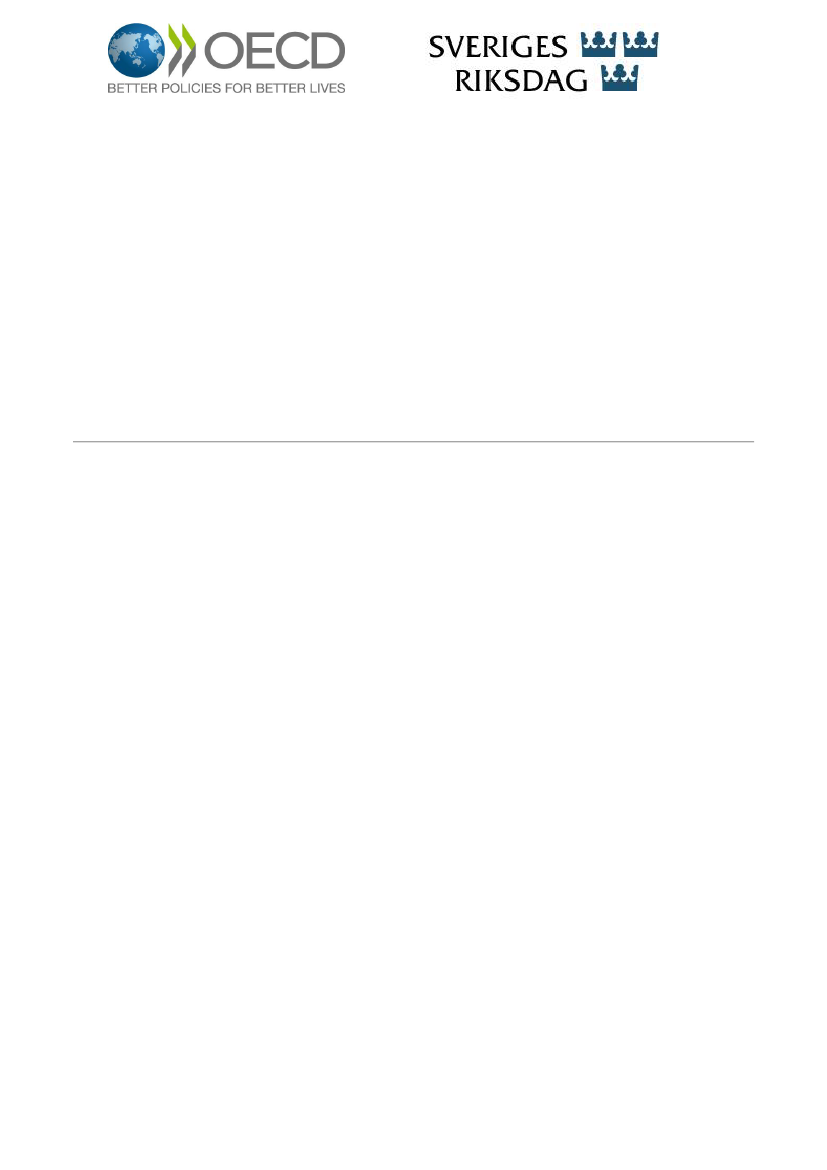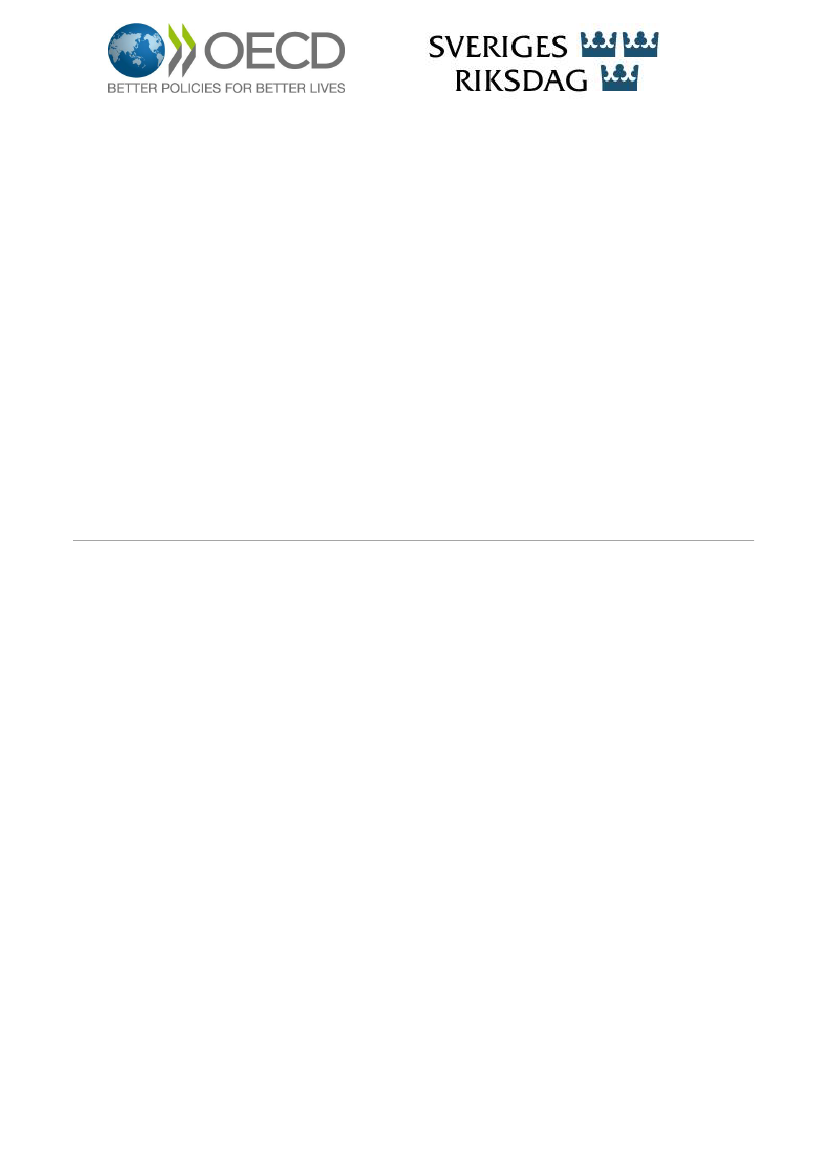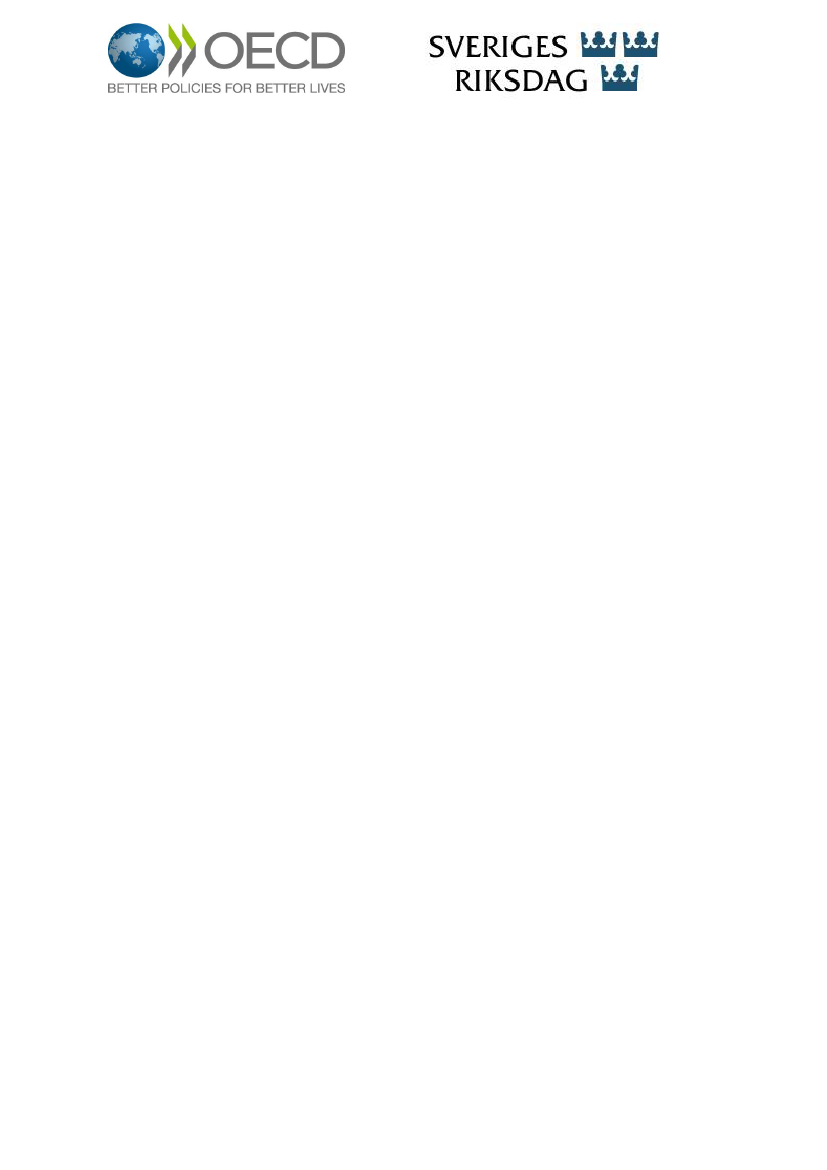Erhvervs-, Vækst- og Eksportudvalget 2012-13
ERU Alm.del Bilag 272
Offentligt
OECD High-Level Parliamentary Seminar17-18 June 2013The Swedish ParliamentStockholm, Sweden
From Economic Turbulence to Inclusive Growth:Lessons from the Nordic Model?Draft programme
Monday, 17 June 2013Chairs:Anthony Gooch,Director, Public Affairs and Communications Directorate, OECDAnna Kinberg Batra,Chair, Committee on Finance, Swedish ParliamentFredrik Olovsson,Vice Chair, Committee on Finance, Swedish ParliamentWelcome Lunch,Sammanbindningsbanan, The Riksdag building, Right WingWelcome,FörstakammarsalenAnthony Gooch,Director, Public Affairs and Communications Directorate, OECDAnna Kinberg Batra,Chair, Committee on Finance, Swedish ParliamentPromoting Inclusive GrowthAndreas Bergh,Associate Professor, Lund University and Research Institute of IndustrialEconomicsYves Leterme,Deputy Secretary-General, OECDÅsa Löfström,Associate Professor, Umeå School of Business and Economics, Umeå UniversityMore than 200 million people are out of work worldwide and poverty continues to affect millions more; in many countries,the gap between rich and poor is widening, youth unemployment is soaring, and access to basic services remains achallenge for many. The global community is calling for change, for solutions that foster economic growth in a moreinclusive manner, with a more equally shared “growth dividend” and less pronounced gaps between the rich and the poor –not only in terms of income, but also in terms of other dimensions that matter for people. Finding alternative growth modelsthat are more inclusive and sustainable has become a concern in public policy circles. The hesitant recovery and thepersistent social crisis demand decisive policy action. The OECD is developing a new vision for inclusive growth thatcombines strong economic growth with improvements in living standards and outcomes that matter for people’s quality oflife (e.g. good health, jobs and skills, clean environment, community support). Part of this exercise is to seek a commonunderstanding of the main elements which comprise inclusive growth and the conditions under which growth can beinclusive. This will allow for the relevant policies and institutions to be put in place to pave a way forward that is both pro-growth and pro-people.
12:00 – 13:1513:15 – 13:30
13:30 – 15:00
15:00 – 15:3015:30 – 17:00
Coffee breakWorkshop: How Parliaments work with OECD and other expertsMembers of Parliament are in constant need of independent and unbiased data, analysis and policy advice to inform theirwork. International organisations, think tanks, universities, and other bodies, such as independent fiscal councils, canprovide this expertise. The OECD can inform parliamentary debates by sharing data, comparative information and
experience, including in identifying best practices and assessing regulatory impact. But how do MPs and their staff actuallywork with these experts? How can they ensure they stay informed and make best use of the wealth of informationavailable? This workshop will be an opportunity for MPs and staffers to share experiences and best practices of how MPscan work with the OECD and other experts. One example from the Swedish Parliament is the creation of an “OECD group”to follow the work of the organisation where all committees are represented. In Chile, the OECD worked with the Chamberof Representatives to establish a Department for Law Evaluation, taking advantage of OECD expertise to supportlegislative bodies in a practical way.
17:00 – 18:00
How’s Life? Evidence from the Better Life IndexAnthony Gooch,Director, Public Affairs and Communications Directorate, OECDIn 2011, the OECD created the Better Life Index – an interactive tool that allows individuals to compare well-being acrosscountries, based on 11 topics identified as essential to the quality of life. The digital platform allows individuals to putdifferent weights on each topic, and thus decide for themselves how to measure well-being. The resulting visualisationprovides a unique view of how countries perform according to the priorities individuals themselves set. The aim of thisindex is to involve citizens in the debate on societal progress; the feedback they provide offers a fresh perspective fromwhich to evaluate public policy and its implementation. It empowers the public by improving their understanding of policy-making and can generate support for needed policy measures. But, what do the results of the past two years tell us? Whatare the preferences of citizens in the Nordic countries and how does this differ from the rest of the world?
18:00 – 19:0020:00
Guided tour of the Old Town,followed by boat to Djurgården islandDinnerGustavianska Våningen, Skansen, Djurgården island
Tuesday, 18 June 201308:30 – 09:0009:00 – 10:30Arrival of participants and morning coffeeLessons from the Nordic ModelLennart Erixon,Professor, Stockholm UniversityPeter Norman,Minister for Financial Markets, SwedenPaul van den Noord,Economic Counsellor to the Chief Economist, Economics Department, OECDThe Nordic countries (generally referring to Denmark, Finland, Iceland, Norway and Sweden) are often regarded as abenchmark, having succeeded better than other countries in combining economic efficiency and growth with a peacefullabour market, a fair distribution of income and social cohesion. Although critics have questioned the sustainability of thissuccess, not least due to the challenges of globalisation, the models of development adopted by the Nordics have provento be relatively resilient in the face of the global economic and financial crisis. The model is pointed to as a source ofinspiration for other people in their search for a better social and economic system. On the other hand, many observersaround the world are amazed that “the bumble-bee can fly” – that the Nordic economies can prosper and grow in spite ofthe presumably weak economic incentives associated with high tax wedges, a generous social security system and anegalitarian distribution of income.
10:30 – 11:0011:00 – 12:30
Coffee BreakCase study: Working with Independent Fiscal InstitutionsLars Calmfors,Professor of International Economics, Institute for International Economic Studies,Stockholm University and former Chair of the Swedish Fiscal Policy CouncilTeodora Cardoso,Chair, Portuguese Public Finance CouncilJean-Philippe Cotis,Chief Counsellor, Cour des Comptes (Court of Auditors), France (TBC)Mario Marcel,Deputy Director, Public Governance and Territorial Development Directorate, OECDAlthough relatively few and novel worldwide, examples of independent fiscal institutions (fiscal councils and parliamentarybudget offices) have existed for several decades in countries like the Netherlands, Belgium, and the United States. Today,a clear trend towards establishing fiscal councils is evident in OECD member countries, with governments, academics andregional and international bodies looking to them (often in concert with new or strengthened fiscal rules) to reinforce fiscalgovernance and to combat deficits and unsustainable debt. Moreover, these actors recognise the potential of such bodies
to reduce information asymmetries, promote transparency and accountability, and to raise the quality of public debate onfiscal policy. The OECD’s Network of Parliamentary Budget Officials and Independent Fiscal Institutions has identified a setof common values among these highly diverse institutions – independence, non-partisanship, transparency, andaccountability, while demonstrating technical competence and producing work of the highest quality that stands up to publicscrutiny – that have formed the basis for the network to develop a set of first OECD Principles for Independent FiscalInstitutions. Among the themes covered in the Principles is fiscal councils’ relationship with the legislature. Of particularimportance is the fiscal council’s contribution, through their work and appearance before relevant legislative committees, tolegislative debate on the budget and fiscal policy. This session explores how parliaments can best work with and learn fromfiscal councils.
12:30 – 13:0013:00 – 14:00
ConclusionsClosing Lunch,Sammanbindningsbanan, The Riksdag building, Right Wing



